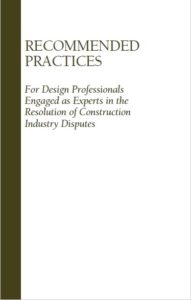42 Organizations Now Endorse Recommended Practices for Design Professionals Engaged as Experts in the Resolution of Construction Industry Disputes

Forty-two organizations now endorse Recommended Practices for Design Professionals Engaged as Experts in the Resolution of Construction Industry Disputes, an annotated list of 13 “shoulds and should-nots” originally developed by the Interprofessional Council on Environmental Design (ICED).
The Geoprofessional Business Association (GBA) recognized the need for the document and spearheaded its development through ICED, an “umbrella organization” also including, among others:
- the American Society of Civil Engineers (ASCE),
- National Society of Professional Engineers (NSPE),
- American Council of Engineering Companies (ACEC),
- and The American Institute of Architects (AIA),
all of which are endorsers. GBA accepted responsibility for the document’s publication and management, as well as gathering additional endorsers. The 37 additional endorsers comprise a “who’s-who” of construction-industry organizations.
According to GBA President Steven D. Thorne, P.E., D.GE (Terracon), Recommended Practices for Design Professionals Engaged as Experts in the Resolution of Construction Industry Disputes is believed to have received more construction-industry-organization endorsements than any similar document or position statement ever developed. Created in 1988, “Recommended Practices…” has been used extensively – and very successfully – in legal proceedings, especially in matters involving the standard of care.
According to GBA Executive Vice President John P. Bachner,
“To find a design professional negligent, a trier of fact – a judge or a jury – has to believe that the design professional failed to uphold the standard of care. But first the trier of fact has to decide what the standard of care actually was at the time of the incident in question. As it so happens, the standard of care is a moving target. It’s what’s commonly done by peer professionals operating in a given area at a given time. Practices evolve, however. What is common today may have been unheard of just five years ago.”
Bachner explained that courts almost always require an expert witness to explain the standard of care in terms the trier of fact – usually a jury – can readily understand. He went on to say,
“All too often, however, experts testify about the standard of care based on what they would have done or what a book says to do, and either or both of these measures may be seriously out of sync with reality. Forty-two prestigious organizations concur unanimously that experts need to conduct research to know what the standard of care was at the time it allegedly was violated. Experts who are cross-examined need to be able to explain how they reached their opinion about the standard of care.”
Some of the other issues addressed in the document include conflicts of interest, expert qualifications, research methods and integrity, illustrative devices, and confidentiality.
Because the document has been used extensively to impeach the testimony of “hired-gun experts,” GBA advises that leaders of “every engineering, environmental, and architectural firm in the nation should be familiar with ‘Recommended Practices.’ Their lawyers and insurance agents need to be aware of it, too.”
Recommended Practices for Design Professionals Engaged as Experts in the Resolution of Construction Industry Disputes is available at GBA’s website (www.geoprofessional.org) or by contacting GBA staff at info@geoprofessional.org or 301-565-2733.
Established in 1969, GBA “helps its members – geoprofessional firms – and their clients confront risk and optimize performance.” Geoprofessional firms provide geotechnical, geologic, environmental, construction-materials engineering and testing, and related professional services.
All GBA Member Firms’ technical activities are under the full-time control of an individual who is legally and/or ethically bound to hold paramount public health, safety, and welfare. GBA’s associate membership comprises geoprofessional constructors; geoprofessional educators; geoprofessionals employed by government agencies, not-for-profit organizations, and industry; and attorneys and other consultants to GBA Member Firms.
Obtain more information about GBA at its website (www.geoprofessional.org) or by contacting the organization at info@geoprofessional.org or 301-565-2733.